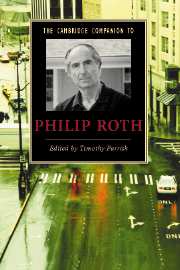Book contents
- Frontmatter
- Introduction: Roth at mid-career
- 1 American-Jewish identity in Roth’s short fiction
- 2 Roth, literary influence, and postmodernism
- 3 Zuckerman Bound: the celebrant of silence
- 4 Roth and the Holocaust
- 5 Roth and Israel
- 6 Roth’s doubles
- 7 Revisiting Roth’s psychoanalysts
- 8 Roth and gender
- 9 Roth and ethnic identity
- 10 Roth’s American Trilogy
- 11 Roth’s autobiographical writings
- Further reading
- Index
1 - American-Jewish identity in Roth’s short fiction
Published online by Cambridge University Press: 28 May 2007
- Frontmatter
- Introduction: Roth at mid-career
- 1 American-Jewish identity in Roth’s short fiction
- 2 Roth, literary influence, and postmodernism
- 3 Zuckerman Bound: the celebrant of silence
- 4 Roth and the Holocaust
- 5 Roth and Israel
- 6 Roth’s doubles
- 7 Revisiting Roth’s psychoanalysts
- 8 Roth and gender
- 9 Roth and ethnic identity
- 10 Roth’s American Trilogy
- 11 Roth’s autobiographical writings
- Further reading
- Index
Summary
Eli Peck, Philip Roth's characteristically neurotic protagonist in the short story “Eli, the Fanatic,” ardently maintains of the Jewish refugees who, emerging from the devastation of the Holocaust, settle in the suburban town of Woodenton, “I am me. They are them.” In this way, he defiantly dissociates himself from the defining and, to him, static markers of Jewish identity and history, both past and immediate. Eli Peck, a product of the secularization of American Jewry in the mid-twentieth century, believes himself freed from the restricting weight of a legacy linked to him only by an imposed inheritance, the remnants of history and blood. For Eli, the weight of such identification is as heavy as the stone tablets and a liability in America. In his insistent separation from his identity as a Jew, represented by his uneasy fear of the Jewish refugees, whose yeshiva is a constant reminder to Eli and the other Jews of Woodenton of the dangers of seeming “too Jewish,” Roth's apprehensively charged protagonist unconsciously exposes his fears of marginalization, shared by the other “assimilated” Jews of suburban Woodenton, of forever being considered outsiders and interlopers among the rightful inheritors of American culture.
Eli Peck's disavowal of the European refugees, the displaced men and “the little kids with little yamalkahs chanting their Hebrew lessons,” who have come to infiltrate the suburban haven of Woodenton, is motivated by the sure conviction that their very presence will threaten the “good healthy relationship in this town [among] modern Jews and Protestants” (“Eli, the Fanatic,” 277-78).
- Type
- Chapter
- Information
- The Cambridge Companion to Philip Roth , pp. 9 - 21Publisher: Cambridge University PressPrint publication year: 2007
- 1
- Cited by

